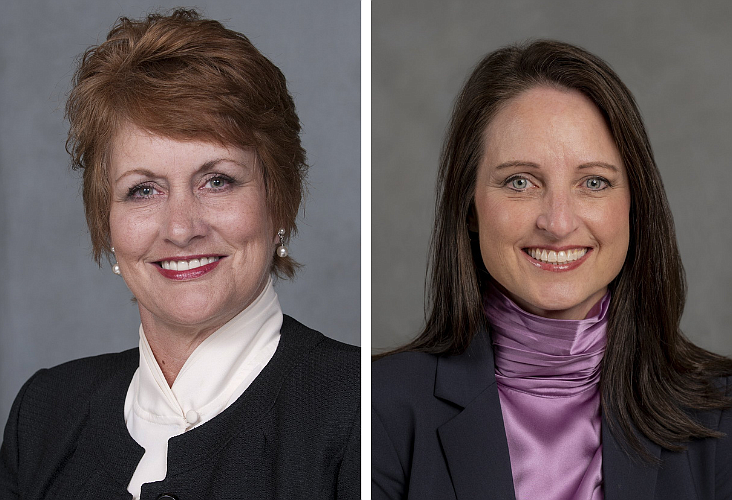The Associated Press has projected that Justice Karen Baker and Justice Rhonda Wood will be in a runoff for Arkansas State Supreme Court chief justice on Nov. 5.
With 99% of the ballots counted, Baker held a narrow lead over Wood.
12:16 a.m.: Wood ekes out narrow lead in chief justice race
Polling in the Arkansas State Supreme Court chief justice race at midnight Wednesday showed a tight race between the three top vote-getters with a likely runoff Nov. 5.
With 85% of the ballots counted, Justice Rhonda Wood held a narrow lead over Justice Karen Baker, who held an even narrower lead over Justice Barbara Webb.
Jay Martin, the only candidate who doesn’t already hold a seat on the state Supreme Court, was fourth by more than 20,000 votes.
Unofficial returns from The Associated Press were:
Wood 106,425
Baker 103,329
Webb 100,522
Martin 80,055
If no one receives more 50% of the vote, the two top finishers will face off in November to see who will replace Supreme Court Chief Justice John Dan Kemp, who is retiring at the end of his current term Dec. 31.
Regardless of which candidate prevails in the runoff, a vacancy will be created in that position and it will be up to Gov. Sarah Huckabee Sanders to appoint someone to fill the remainder of that person’s unexpired term.
Kemp, 72, of Mountain View is stepping aside after one term because of a law that requires circuit judges and higher to forfeit their retirement benefits if they run for judicial office after turning 70.
The Supreme Court is the ultimate arbiter of Arkansas constitutional issues. There are seven justices, including the chief. The chief justice serves an eight-year term like the state’s other six justices, and the chief’s vote counts the same as those of the other justices. When in the majority, the chief justice decides who writes the opinion of the court; otherwise, the most senior justice in the majority is assigned the task of writing the opinion.
The chief justice earns $202,987 and handles administrative duties. The chief justice is typically the liaison, if not the face, of the state’s judiciary to lawmakers and the public by delivering the annual state of the judiciary address.
The seven justices on the Arkansas Supreme Court are selected through nonpartisan elections. They compete in nonpartisan general elections — occurring at the same time as primary elections for other state officials — in which the candidate who receives more than 50 percent of the vote wins the seat. If no candidate garners a majority of the vote, the top two candidates compete in a runoff during the November general election.
Cody Hiland, a former federal prosecutor and chairman of the state Republican party, was appointed by Sanders to fill the Position 2 vacancy created by the death of Justice Robin Wynne, who died June 21, 2023, at the age of 70.
With Courtney Hudson — currently serving in Position 3 on the high court — projected to win the seat vacated by Wynne’s death, the Republican governor will appoint a second Supreme Court justice to fill Hudson’s unexpired term at Position 3.
Sanders’ predecessor, Republican Asa Hutchinson, appointed only one justice during his two terms in office. Democratic Gov. Mike Beebe had two justice appointees during his tenure, one of whom — William H. Bowen — spent about a week on the job before poor health forced his retirement.
Wood, 54, of Conway, currently holds state Supreme Court position 7 and is serving a second term on the state’s high court. She was first elected to the Supreme Court in 2014 and was re-elected in 2022. Her current term ends Dec. 31, 2030.
Wood is a graduate of Hendrix College in Conway and graduated from the UALR Bowen School of Law in 1999. She has experience in appellate law, health law and business law, and has practiced in Arkansas’ federal trial and appellate courts.
She served as 20th Judicial District Circuit Court judge from 2007 to 2012 and as an Arkansas Court of Appeals associate judge from 2013 to 2014, prior to her election to the Arkansas Supreme Court in 2014. Since her admission to the Arkansas Bar, Wood has worked as a hearing officer for the Conway Housing Authority, and has practiced law in the Wood Law Firm in Conway and the law firm of Williams & Anderson PLLC in Little Rock.
She is a member of the Arkansas Judicial Council and has served on the Committee for Education as chair, Committee for Long-Range Planning, Committee for Racial and Gender Equality, and as co-chair of the Committee for Juvenile Drug Court.
Wood holds memberships in the Federalist Society (National and Arkansas Chapter), the Arkansas Bar Association and the American Bar Association and is a five-time recipient of the Arkansas Bar Association’s awards for Best of CLE Presentation and Outstanding Service.
According to her campaign website, some of Wood’s goals are to make the court system more citizen-oriented and business friendly, implement text notification of hearings, rewrite small claims petitions and make the format electronic for ease of use for citizens. She said she will work with district and circuit judges to implement innovative options for alternative court attendance for employees to avoid missing work for necessary court appearances.
Baker, 60, of Clinton, is one of the high court’s longest-serving justices, having been elected in a special election in 2010. She ran unopposed in 2014 and was elected to a third term in 2022 after fending off a challenge from Sebastian County Circuit Judge Gunner DeLay with 64 percent of the vote.
Baker’s current term ends Dec. 31, 2030.
A 1981 Clinton High School graduate, Baker graduated from Arkansas Tech University in 1983 and the University of Arkansas at Little Rock School of Law in 1987. After practicing law in private practice for eight years, from 1987 to 1995 — serving as public defender in Van Buren and Searcy counties from 1989 to 1995 — Baker served as 20th Judicial District Circuit/Chancery/Juvenile Judge from 1995 to 1996 and as Circuit/Chancery Judge from 1997 to 2000.
She was elected to the Arkansas Court of Appeals as an associate judge in 2000 and served on the appeals court bench from 2001 to 2010, when she was elected to the Arkansas Supreme Court.
Baker holds memberships on the Arkansas Judicial Council; Arkansas Bar Association; American Bar Association; Van Buren/Searcy County Bar Association; Faulkner County Bar Association, and the Arkansas Association of Women Lawyers. She also serves as Supreme Court liaison for the Arkansas Continuing Legal Education Board and the Arkansas Professional Practicum Committee.
Webb, 66, of Benton, currently holds state Supreme Court Position 4, to which she was elected in 2020. Her current term expires Dec. 31, 2028.
Webb, who is married to former Republican Party of Arkansas Chair Doyle Webb, received a bachelor of arts degree in political science from the University of Arkansas in Fayetteville in 1979 and her juris doctorate from the UALR Bowen School of Law in 1982.
She served as in-house counsel to Southwestern Bell Telephone Company from 1982 to 1987 and was in private practice with the law firm of Eichenbaum, Scott, Miller, Liles, & Heister Law, P.A. from 1987 to 1997, and with Quattlebaum, Grooms, Tull, & Burrow, PLLC from 2003 to 2005. From 1997 to 2002, Webb served as prosecuting attorney for the 7th and 22nd judicial districts.
Martin, 54, of North Little Rock, is the only candidate for chief justice not currently sitting on the bench.
Martin, who served in the Arkansas House of Representatives as a Democrat from 2003 to 2006, is an attorney and an ordained Assemblies of God minister and serves as president of the law firm of Wallace, Martin Duke & Russell, PLLC in Little Rock.
Martin, who has practiced law for 27 years, said he’s an outsider running for the court at a time when it needs one to ensure judicial independence. He said priorities as chief justice will be addressing the court system’s backlog of cases from the covid pandemic and ensuring the courts have adequate security and technology.
In addition to serving as an appellate judge, he said, the chief justice must also know how to be an administrator, skills Martin said he’s developed as a lawyer, small businessman, ordained Assemblies of God minister and lawmaker who served a majority leader during his tenure.
This story has been updated with unofficial vote counts and additional details.

